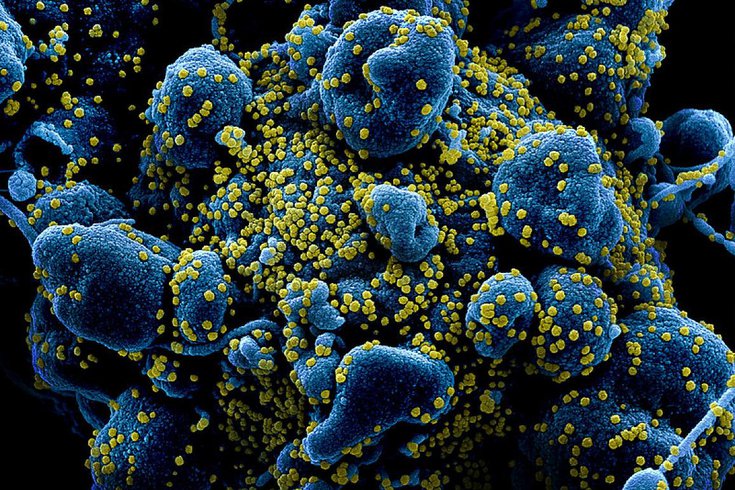
September 14, 2020
 Courtesy/National Institute of Allergy and Infectious Diseases
Courtesy/National Institute of Allergy and Infectious Diseases
People with substance abuse disorders are more likely to be hospitalized or die from COVID-19, according to an analysis of 73 million patients. Above, an apoptotic cell heavily infected by the coronavirus.
New research adds substance use disorder to the list of health issues that place people at greater risk for developing severe COVID-19 complications.
People battling addiction are more likely to become hospitalized or die of COVID-19, according to an analysis of 73 million U.S. patients. They also are more likely to become infected by the coronavirus.
The findings of the study, funded by the National Institutes of Health, were published Monday in Molecular Psychiatry.
Researchers advise health care providers carefully monitor patients with substance use disorder and develop an action plan to mitigate the risk of exposure to the coronavirus.
"The lungs and cardiovascular system are often compromised in people with substance use disorder, which may partially explain their heightened susceptibility to COVID-19," said Dr. Nora D. Volkow, director of the National Institute on Drug Abuse. "Another contributing factor is the marginalization of people with addiction, which makes it harder for them to access health care services.
"It is incumbent upon clinicians to meet the unique challenges of caring for this vulnerable population, just as they would any other high-risk group."
Other medical conditions that increase a patient's risk of severe COVID-19 include cancer, chronic kidney disease, chronic obstructive pulmonary disease, obesity, a serious heart condition, sickle cell disease and type 2 diabetes.
The link between a recent substance use disorder and COVID-19 was strongest for those with opioid use disorder, followed by tobacco use disorder. Alcohol, cannabis and cocaine substance use disorders also were included in the study.
The analysis found 41% of patients with a substance use disorder were hospitalized with COVID-19 and 9.6% died. Only 30.1% of patients without substance use disorder were hospitalized with COVID-19 and only 6.6% of them died.
People also are more likely to become infected with COVID-19 if they have a substance use disorder. People with substance use disorder made up only 10.3% of the study population, but they represented 15.6% of its COVID-19 cases. The data was collected until June 15.
Black Americans with a recent opioid use disorder were four times more likely to develop COVID-19 compared to white Americans. The researchers said the prevalence of hypertension, diabetes, cardiovascular diseases and renal diseases in Black Americans may be a factor.
Researchers called for more vigilance on the screening and treating of substance use disorders during the pandemic, noting more people may be relying on drugs and alcohol to cope with the anxiety and distress.
According to a recent Centers for Disease Control and Prevention report, almost 20% of adults ages 24-44 had started or increased substance abuse during the pandemic. More Americans also have been diagnosed with an anxiety or depressive disorder or contemplated suicide.